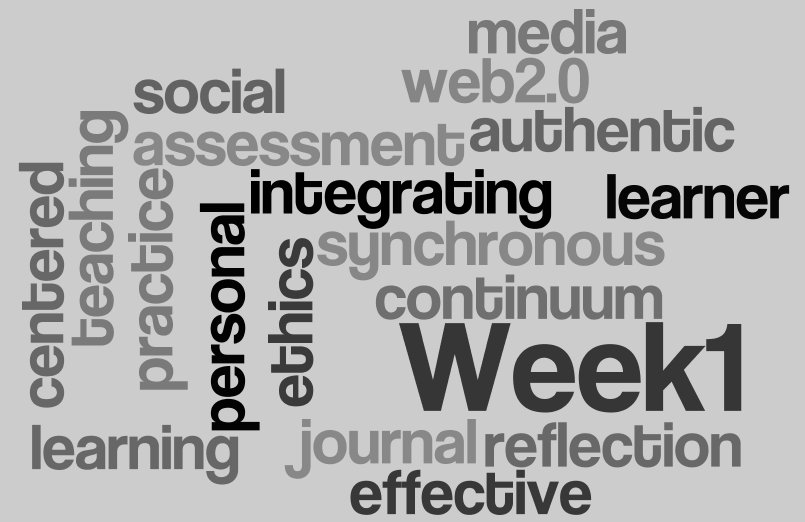Week 1: Authentic Learning and Assessment in Technology-Enabled Learning Environments: An Introduction
Week 1: Authentic Learning and Assessment in Technology-Enabled Learning Environments: An Introduction

Intro to Week1
Audio Transcript
This week, through personal reflection and group activity, you will connect your most powerful learning experiences with the principles of effective authentic learning and assessment and consider these in relation to the tenets of learner-centered teaching. As a class we will also examine the implications for practice when integrating authentic learning and assessment in technology-enabled environments. An additional reflective activity will include the examination of personal goals for enhancing authentic online learning and assessment practices, integrating prior knowledge with new learning, and discussing ethical issues regarding FOIPOP regulations when using Web 2.0 and social media computing applications in teaching assignments.
Learning Outcomes for this week
1. Apply principles of effective authentic learning and assessment to curriculum planning.
2. Apply key concepts of a learner-centered approach to the design of learning and assessment activities in courses.
4. Use technology to develop and support effective authentic learning and assessment practices.
6. Select and apply suitable and relevant authentic assessment methods, including peer and self-assessment.
Resources
Required
Barrett, H. (n.d.) - Why Reflect?
Herrington, J., Reeves, T., and Oliver, R. (2010) – Intro, Ch. 1, 3, 4
Lombardi, M. & Oblinger, D. (2007). Authentic learning for the 21st century: An overview.
Portal, P., Cooper, S., Southwell, J. (2010). Privacy Guide
Supplemental (if background in online learning needed)
Anderson, T. (2004). Towards a theory of online learning.
Watch this 3 minute video as Diana Oblinger talks about how the connected age is making the world different.
Week 1 Activities
Introductions - Post a short video, audio or text introduction in the forum. How to record direct to Youtube handout.
Activity 1: Learning and Assessment Continuum - This synchronous class activity asks you to think about your own assessment experiences as a student in a formal or informal setting and place it on an assessment continuum from more traditional to more authentic. To prepare, read the Herrington text and Lombardi article. Watch the Latest News forum for announcements from the course facilitator regarding the date and time for this activity.
Activity 2: Reflective Activity on Course Outline, Learning Outcomes (class forum) - Participate in class discussion. Review the course outline. Reflect on what you are looking forward to learning, what aspects of authentic learning and assessment you are not conversant as described by Lombardi in Authentic learning for the 21st century: An overview, and how you might prepare yourself to integrate your prior knowledge with your new learning.
![]() Journal - You will use a journal to record your critical thinking, analysis and understanding of key elements of authentic activity throughout this course. Reflection is a key learning component of this course. Read the short excerpt from Barrett about the importance of reflection in learning. You will be asked to reflect on your learning in your weekly journal entries. Your journal is private, you will not be sharing it publicly. However, you will select entries from your journal for inclusion in your ePortfolio in Assignment 5 (introduced in week 2). So choose a format and structure (e.g. datestamp entries) that will enable you to review it and copy selections easily. You can use tools such as a private wiki or blog, text document, notebook, etc. Please make the following two entries for Week 1:
Journal - You will use a journal to record your critical thinking, analysis and understanding of key elements of authentic activity throughout this course. Reflection is a key learning component of this course. Read the short excerpt from Barrett about the importance of reflection in learning. You will be asked to reflect on your learning in your weekly journal entries. Your journal is private, you will not be sharing it publicly. However, you will select entries from your journal for inclusion in your ePortfolio in Assignment 5 (introduced in week 2). So choose a format and structure (e.g. datestamp entries) that will enable you to review it and copy selections easily. You can use tools such as a private wiki or blog, text document, notebook, etc. Please make the following two entries for Week 1:
- Reflecting on the discussions in the forum, record your understanding of authentic learning and assessment. What aspects of your current teaching seem to allign with authentic learning and assessment? What aspects of authentic learning and assessment are still not clear to you? How has "the three ways the world has changed" that Diane Oblinger discusses in her video affected how and what you currently teach (or how and what you might teach in the future)?
- British Columbia's Freedom of Information and Protection of Privacy Act (FOI/POP) requires faculty to adhere to specific regulations. Read the Porter, et. al. Privacy Guide for Faculty Using 3rd Party Web Technology (Social Media) in Public Post-Secondary Courses and your own institution's policies or government body if no institutional policies exist. In your journal explain your understanding of these regulations, how you have applied them to date (or not), how your institution supports your use of them in your teaching practice, and how you will ensure that your teaching activities are in compliance with this Act.